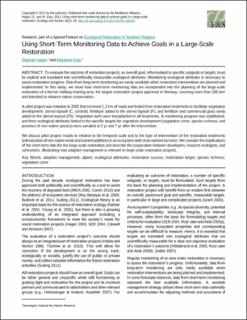Using short-term monitoring data to achieve goals in a large-scale restoration
Peer reviewed
Published version

Åpne
Permanent lenke
https://hdl.handle.net/11250/3077455Utgivelsesdato
2013Metadata
Vis full innførselSamlinger
- Publikasjoner fra CRIStin - NINA [2364]
- Scientific publications [1392]
Originalversjon
10.5751/ES-05769-180329Sammendrag
To evaluate the outcome of restoration projects, an overall goal, reformulated to specific subgoals or targets, must be explicit and translated into scientifically measurable ecological attributes. Monitoring ecological attributes is necessary to assess restoration progress. Data from long-term monitoring are rarely available when restoration interventions are planned and implemented. In this study, we show how short-term monitoring data are incorporated into the planning of the large-scale restoration of a former military training area: the largest restoration project approved in Norway, covering more than 165 km² and intended to enhance nature conservation. A pilot project was initiated in 2002 that removed 1.2 km of roads and tested three restoration treatments to facilitate vegetation development: stirred topsoil (C, control), fertilizer added to the stirred topsoil (F), and fertilizer and commercial grass seeds added to the stirred topsoil (FS). Vegetation turfs were transplanted in all treatments. A monitoring program was established, and three ecological attributes linked to the specific targets for vegetation development (vegetation cover, species richness, and presence of non-native species) were sampled at 2 yr and 7 yr after the intervention. We discuss pilot project results in relation to the temporal scale and to the type of intervention of the restoration treatments (introduction of non-native seeds and nutrient addition) in an ecosystem with slow nutrient turnover. We consider the implications of the short-term data for the large-scale restoration and describe the cooperation between developers, research ecologists, and contractors, illustrating how adaptive management is relevant to large-scale restoration projects. adaptive management; alpine; ecological attributes; restoration success; restoration target; species richness; vegetation cover Using short-term monitoring data to achieve goals in a large-scale restoration
